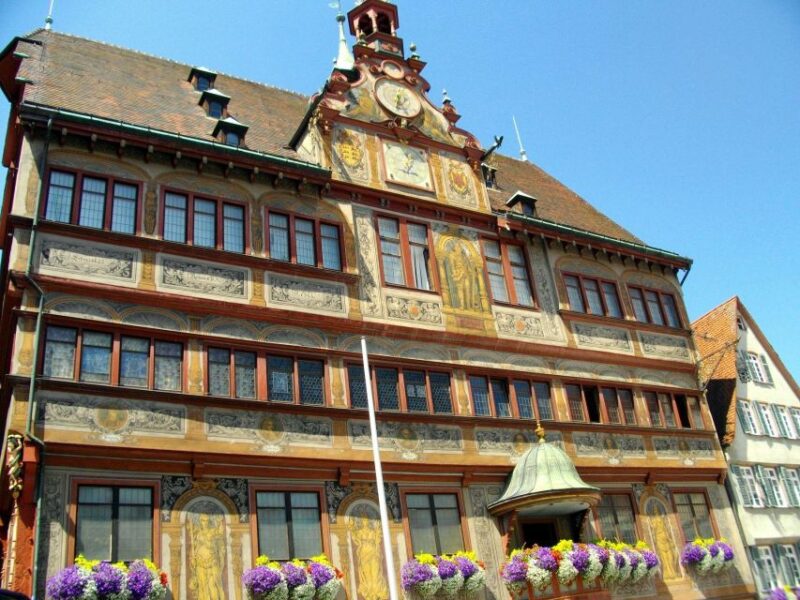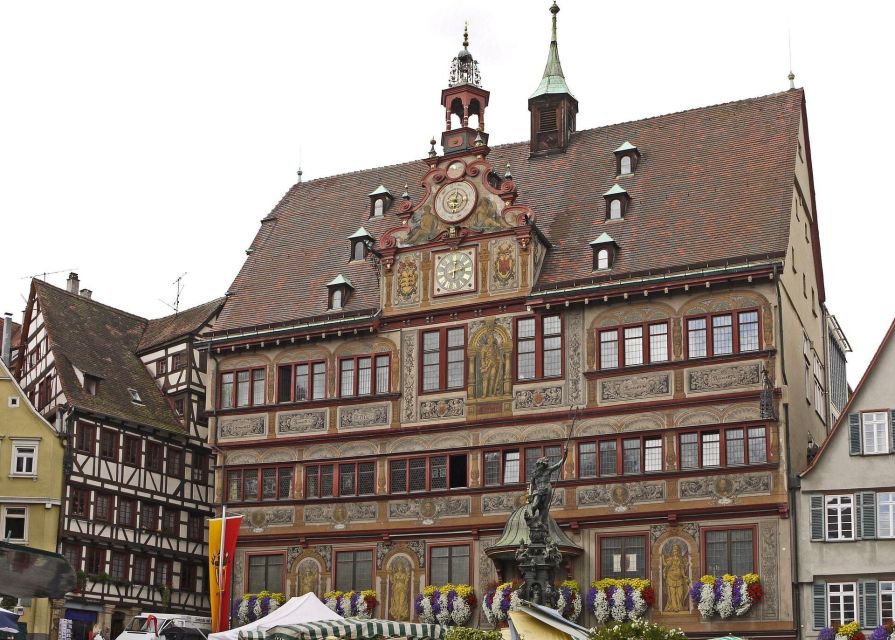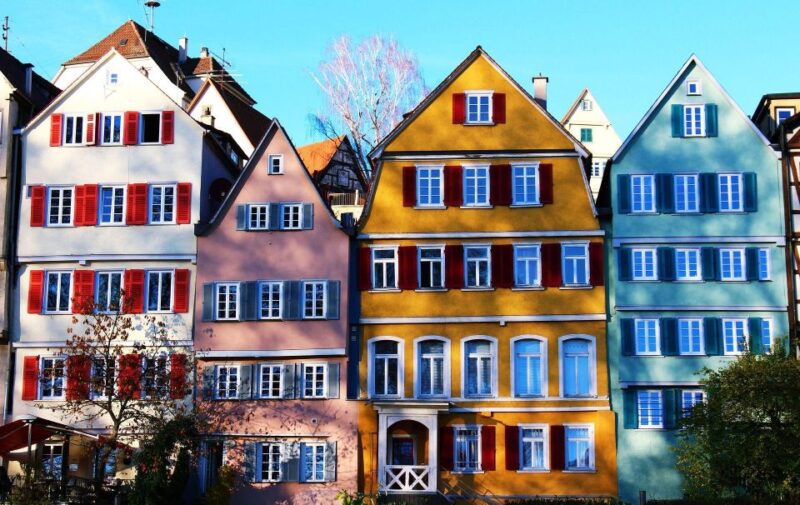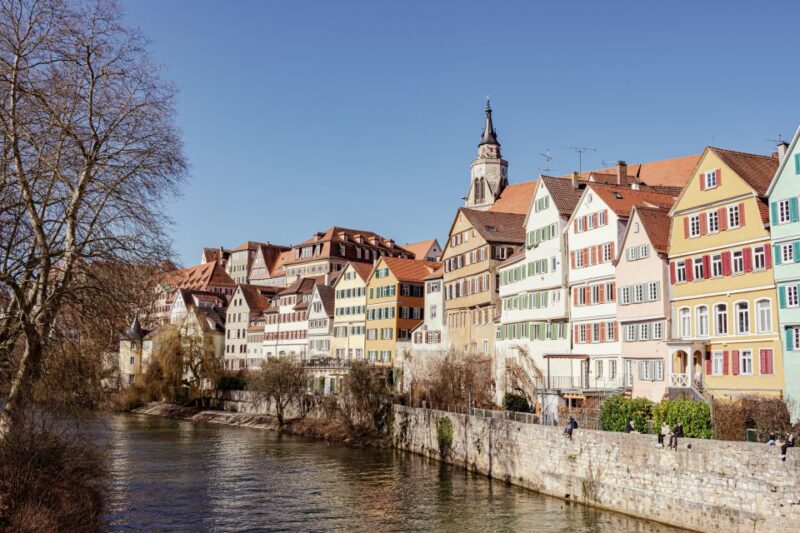Tübingen, a picturesque German city, beckons visitors to explore its rich history and cultural heritage through a private guided walking tour. Starting from the iconic Eberhards Bridge, this 1.5-hour experience delves into the city’s past, uncovering the stories of its notable residents and the university that has shaped its identity. Whether you’re seeking to uncover the significance of the Stockerkahn tradition or gain insights into Tübingen’s resilience during World War II, this customizable tour promises to captivate your senses and leave you eager to discover more about this remarkable destination.
Key Points

- Immersive 1.5-hour private walking tour of Tübingen’s historical landmarks, including Eberhards Bridge and the Stockerkahn riverboat tradition.
- Explore Tübingen’s resilience during World War II and the town’s rich cultural and intellectual heritage, with a focus on notable residents and scholars.
- Discover the medieval architecture and history of Eberhard Karl’s University, one of Germany’s oldest universities.
- Customizable tour experience to cater to individual interests, with flexible booking and cancellation policies.
- Gain insights into Tübingen’s balance of tradition and modernity, and its identity as a vibrant student town.
Tour Overview

This private guided walking tour in Tübingen offers participants an immersive 1.5-hour experience exploring the town’s rich history and cultural heritage.
The tour caters to groups of up to 15 people and is led by live guides available in both English and German.
Starting from Eberhards Bridge, the tour delves into the unique Stockerkahn tradition, a distinctive riverboat experience in Tübingen.
Participants will learn about the town’s notable residents and scholars who’ve shaped its past, as well as its resilient history during World War II.
The tour also highlights the significance of Eberhard Karl’s University, one of Germany’s oldest institutions of higher learning, and the well-preserved medieval center contrasting with the lively atmosphere of a cosmopolitan student town.
You can also read our reviews of more tours and experiences in Tubingen.
Booking Information

Booking the private guided walking tour in Tübingen is straightforward, with free cancellation up to 24 hours in advance for a full refund and the option to reserve a spot without paying until later.
Travelers can check availability for various starting times to find the most convenient option.
Gratuities and entrance fees aren’t included in the base price of €5,365 per group, which covers up to 15 participants.
The tour is led by a local professional guide dedicated to the group and can be customized during the experience.
With its flexible booking policy and all-inclusive pricing, this walking tour offers a hassle-free way to explore the historic town of Tübingen.
Experience Highlights

Exploring Tübingen’s Stockerkahn tradition, a unique riverboat experience, provides a captivating glimpse into the town’s storied past.
Discovering the lives of notable residents and scholars who’ve shaped Tübingen’s cultural fabric offers a deeper appreciation for the community’s illustrious history.
Delving into the town’s resilient story during World War II underscores its perseverance in the face of adversity.
The tour highlights include:
-
Diving into the history of Castle Hohentübingen, a local landmark.
-
Understanding the significance of Eberhard Karl’s University, one of Germany’s oldest universities.
-
Exploring the well-preserved medieval center and its contrast with the lively atmosphere of a cosmopolitan student town.
-
Customization options available during the tour to cater to individual interests.
Historical Context
Tübingen is located in the Neckar valley between the Black Forest and the Swabian Jura, where the old town dates back to the Middle Ages, resembling its 15th and 16th-century appearance. This well-preserved medieval center contrasts with the lively atmosphere of a cosmopolitan student town, home to one of Germany’s oldest universities, Eberhard Karl’s University. The town has a resilient history, having weathered challenges like World War II. To better visualize Tübingen’s historical context, consider the following table:
| Era | Key Characteristics |
|---|---|
| Middle Ages | Medieval architecture, university founding |
| 15th-16th Century | Preserved historic center |
| World War II | Resilience in the face of adversity |
| Today | Vibrant student town, historic landmarks |
| Future | Balancing tradition and modernity |
Stockerkahn Tradition

One of the unique traditions that visitors can experience in Tübingen is the Stockerkahn, a traditional riverboat that has been a part of the town’s cultural heritage for centuries.
These flatbottom boats were originally used to transport goods and people along the Neckar River. Today, they offer a charming way to explore the town’s picturesque waterways.
The Stockerkahn experience includes:
-
Leisurely cruises along the Neckar River
-
Historical commentary from knowledgeable guides
-
Views of Tübingen’s medieval architecture and landmarks
-
An opportunity to take in the town’s rich cultural traditions.
The Stockerkahn tradition is a beloved part of Tübingen’s identity, providing visitors with a unique and authentic way to discover the town’s enduring character.
Notable Residents and Scholars
Throughout its storied history, Tübingen has been the home and workplace of numerous notable residents and scholars who’ve left an indelible mark on the town’s intellectual and cultural landscape.
Among them is the renowned philosopher Friedrich Hölderlin, whose poetic genius and contributions to German Romanticism have been celebrated worldwide.
The town has also been associated with the influential theologian and Reformer Johannes Brenz, as well as the pioneering mathematician and astronomer Johannes Kepler, who made groundbreaking discoveries during his time in Tübingen.
These figures, along with many others, have imbued the town with a rich intellectual heritage that continues to captivate visitors and residents alike.
Resilient History of World War II
The resilience of Tübingen’s residents shone through during the tumultuous years of World War II, as the town weathered the upheaval and emerged with its historic charm and academic spirit intact.
Despite the challenges, Tübingen remained a bastion of education and culture, with the renowned Eberhard Karl’s University continuing to thrive.
The town’s well-preserved medieval architecture and scenic Neckar River setting provided a sense of stability and hope amidst the chaos.
Key ways Tübingen’s resilience manifested include:
-
Maintaining university operations and research
-
Protecting historic buildings and landmarks
-
Organizing community support networks
-
Fostering a spirit of resilience and unity
This steadfast determination has endured, making Tübingen a testament to the enduring power of a community in the face of adversity.
Eberhard Karl’s University
Eberhard Karl’s University, one of Germany’s oldest institutions of higher learning, has been a cornerstone of Tübingen’s academic and cultural landscape for centuries. Established in 1477, the university has played a pivotal role in shaping the town’s reputation as a hub of intellectual and scholarly pursuits, attracting students and scholars from around the world.
| Academic Disciplines | Notable Alumni |
|---|---|
| Philosophy | Friedrich Hölderlin |
| Law | Wilhelm Dilthey |
| Theology | Georg Wilhelm Friedrich Hegel |
The university’s rich history, diverse curriculum, and distinguished alumni have contributed immensely to Tübingen’s cultural and intellectual legacy, making it an integral part of the town’s unique identity.
Frequently Asked Questions
Is the Tour Suitable for Guests With Mobility Issues?
The tour may not be suitable for guests with mobility issues, as it is a walking tour that covers uneven terrain and involves navigating historic streets and landmarks. Accommodations may be available, but guests should inquire about accessibility prior to booking.
Do the Tours Accommodate Non-English/German Speaking Participants?
The tours accommodate non-English/German speaking participants by offering live tour guides in both English and German. Guests can choose the language that best suits their needs for a personalized and inclusive experience.
Are There Any Additional Fees or Taxes Not Included in the Price?
According to the tour details, the price does not include any additional fees or taxes. The only costs mentioned are the base price per group, with no extra charges specified.
Can the Tour Be Customized to Include Specific Interests or Requests?
Yes, the tour can be customized to include specific interests or requests. The local guide is available to tailor the experience to the group’s preferences and provide more in-depth information on areas of particular interest.
What Is the Maximum Group Size for Private Tours?
The maximum group size for private tours is up to 15 participants. The tour is a private guided walking experience that can accommodate small groups.
Recap
Tübingen’s private guided walking tour offers visitors a captivating glimpse into the city’s rich history, from its medieval architecture to the legacy of its renowned university and eminent scholars.
Exploring the picturesque Eberhards Bridge, you will discover the city’s resilience during wartime and explore the unique Stockerkahn tradition.
All while learning about the notable figures who’ve shaped Tübingen’s cultural landscape.
You can check availability for your dates here: